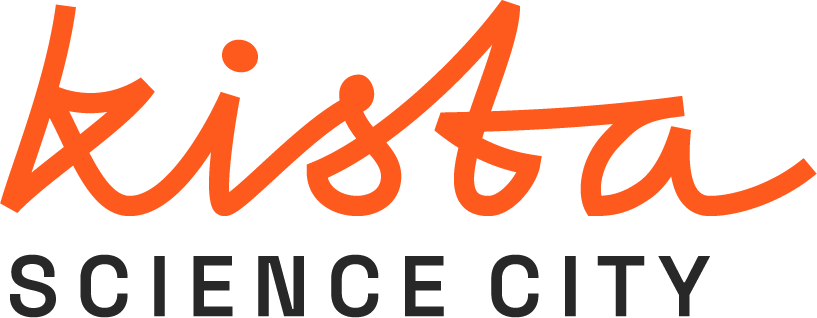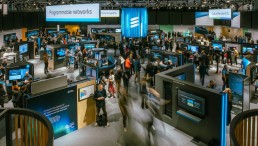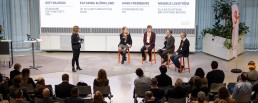Newsletter
News from Kista Science City
Hello and welcome to our newsletter – your go-to source for updates from the Kista Science City community. From inspiring local activities to insights and initiatives that shape a sustainable tomorrow, we’ve got you covered.
This month, we’ll cover reflections and community highlights from MWC 2024, and explore the intersection of defense and innovation in Sweden, where the collaboration between the civil and defense sectors is enhancing national security. We also spotlight the development of digital twin technology, with ongoing projects from MIT, KTH, RISE, and the City of Stockholm. Initiatives driving change in urban planning and sustainability efforts.
Want to share your news or event? We’d love to hear from you!
Happy reading,
Kista Science City
Earlier editions
2023
December
October
September – Mobility Day
June – Space
April – Cybersecurity
February
Sign up to stay updated on what’s going on in Kista Science City.
Mobile world congress 2024
Photo credit: Ericsson
Mobile World Congress
Mobile World Congress (MWC) 2024 has wrapped up. The annual world-leading event brings together industry leaders and innovators from across the globe to showcase the cutting edge of mobile technology. This year’s event was rich in innovations, demos, and discussions focusing on what’s on the horizon for mobile connectivity and its impact on our world.
Key takeaways:
5G and beyond: A hot topic of MWC 2024 was on the development and standardization of 6G technology. This included talks on how these advancements would impact various industries such as manufacturing, healthcare, and transportation. Ericsson and Sivers semiconductors were among the many Swedish companies showcasing their technologies and applications of 5G and their move towards 6G.
Artificial intelligence (AI): Artificial intelligence (AI) unsurprisingly remained a central theme at MWC 2024. From optimizing network performance to streamlining operations and personalizing user experiences, we can expect AI to play an increasingly crucial role in shaping the future of mobile technology. During MWC, Intel took to the stage to showcase their latest advancements in the field of AI, demonstrating how their technologies can modernize and help shape the future of network and edge computing.
Sustainability and inclusivity: Many companies demonstrated the potential of innovative technologies to foster more inclusive and sustainable communities worldwide. Ericsson is one of them, highlighting their efforts in driving positive change, ensuring broader access to technology, and moving towards sustainability within the tech sector.
Börje Ekholm, CEO at Ericsson comments, “What we see here is a convergence of trends. We see the AI, we see the cloud, and we see mobility converging. And as I see it, mobile connectivity will be the critical underpinning to scale Cloud and AI very fast. This will put demands on the networks. It will require ubiquitous coverage, high performance, flexible and programable networks.” He adds, “That’s a new era we’re entering, where 5G plays a big role because 5G has new features like speed, latency, quality of service, location. All of that will be used for enterprise digitalization. I think this is exciting.”
The insights from MWC 2024 paint a picture of a future where tech continues to push boundaries. As we move towards a more connected, intelligent, and inclusive world, the innovations showcased during MWC pave the way for an exciting technological journey ahead.
Digital twins and real-world impact
Digital twins & real-wold impact
In a world of rapid tech advancements, Kista’s tech ecosystem spearheads digital twin advancement, with numerous companies and research teams pushing technological boundaries and demonstrating real-world applications across urban development and environmental sustainability.
The mix of digital twin projects underscores the importance of collaboration in driving new tech advancements. Within this ecosystem, a multitude of local research initiatives, and market- and government-driven projects are interconnected through overlapping project and reference groups. Datasets are shared among these projects to enrich the digital twins with diverse perspectives, enhancing their utility and scope, and creating an innovative arena for idea exchange and discoveries. This collaborative environment not only accelerates technological progress but also strengthens Kista’s role in hosting and fostering transformative projects in this field.
The potential of digital twins
A digital twin is a dynamic replica of a physical entity or system, bridging the physical and virtual worlds through data and simulation. This enables businesses and researchers to understand complexities, predict future conditions, and make informed decisions in real time.
Digital twins are applied in areas like urban planning, infrastructure, healthcare and manufacturing, offering unique insights into system performance and environmental impact. Lucas Uhlén, project leader at Kista Science City, highlights the practical benefits of these technologies, saying: ”Just as a shared blueprint guides everyone from plumbers to electricians in a building project, digital twins achieve a similar unity. They bring cross-disciplinary teams onto the same page, ensuring projects evolve smoothly from concept to integration. This approach fosters a common understanding of a challenge and its dependencies, which is vital for aligning diverse expertise and streamlining the development and maintenance of complex solutions.”
Spotlight on digital twin projects
Kista is home to several initiatives that showcase the practical applications and benefits of digital twins. From enhancing urban planning to optimizing environmental sustainability, these projects represent the cutting edge of digital twin solutions:
Digital Vision Kista, a collaborative partnership including the City of Stockholm, KTH, Ericsson, RISE, and Kista Science City, is pioneering the development of a visual 3D model for the Kista area. By integrating data from building plans, environmental sensors, and traffic patterns, this digital twin visualizes traffic flows and infrastructural changes. It offers valuable insights for traffic management and building energy needs throughout various stages of construction and use. The project aims to transform IoT sensor data into actionable insights for municipalities, demonstrating a model for leveraging digital twins in sustainable urban development and aligning with Agenda 2030 objectives.
Project Gemini is a collaboration between MIT and KTH through the Senseable Stockholm Lab, focusing on the impact of traffic flows on emission levels. Through the integration of emission sensors and traffic data, the project seeks to understand and mitigate environmental impacts in urban settings. This initiative illustrates how local synergies and shared data platforms can significantly contribute to developing sustainable urban environments.
Digital Vision Sverige, led by RISE, is an initiative to advance digital twin development across Sweden’s urban planning sector. By integrating data from multiple sources, digital twins offer a comprehensive view of urban landscapes, facilitating better planning, decision-making, and collaboration. This initiative aims to foster a resilient society prepared to face climate change, green transitions, and future crises through informed, data-driven strategies.
Synergies and collaboration
As the exploration and expansion of digital twins continue, Kista emerges as a focal point for this technological progress. Recognized by municipalities, academia, and industry alike as a natural hub for innovation, Kista facilitates a collaborative environment for knowledge exchange and the development of testbeds. In doing so, it plays an important role in realizing the potential of digital twins for the benefit of society and people.
Do you want to know more about Kista’s platform for testing and development of digital twins? Reach out to Lucas Uhlén at Kista Science City.
Civil tech to power up defence
Civil tech to power up defence
With global security challenges on the rise, the integration of new technologies into the defense sector has become a priority for Sweden. Central to this initiative is the effort to bridge the gap between the civil sector’s technological solutions and the defense industry’s specific needs. Sweden’s rich ecosystem of startups and scaleups is increasingly recognized as crucial to strengthening Sweden’s framework as these companies offer groundbreaking innovations and fresh perspectives that help navigate the challenges of modern security threats.
Bridging civil and defence sectors
Shared visions and increased collaboration between the civil and defence sectors are key. There is a pressing need to close the gap that has been widening between these sectors, and actors across the spectrum call for a more integrated approach. The synergy of civil sector innovation and defence expertise safeguards national security.
A tradition of innovation
Sweden’s role as a pioneer in technological innovation is a strategic asset in its defence policy. As security concerns increase, we must ensure that Sweden remains at the forefront of defence technology, ready to meet the challenges of tomorrow. This includes investing in research and development, encouraging cross-sectoral knowledge exchange, and creating an environment where innovative ideas can flourish and be rapidly deployed.
The role of startups and scaleups
Startups and scaleups are essential partners in driving technological advancements in the defence sector. Their agility, innovative approaches, and groundbreaking technologies are critical for enhancing Sweden’s defence capabilities, making their involvement essential for the nation’s security framework. To boost this involvement, there is a need for supportive frameworks that facilitate these partnerships, including funding mechanisms, regulatory support, and platforms for collaboration.
Insights from the Swedish Minister for Defence
At a recent event on Defense and Innovation, Swedish Minister for Defence, Pål Jonson, stressed the critical need for innovative solutions amidst growing security challenges in Sweden and Europe. Jonson acknowledged the civil sector’s significant role and potential in enhancing Sweden’s defence through technology and innovation. He also emphasized the government’s desire for more coordinated efforts in innovation and for lowering the barriers for new companies to contribute to the defence sector.
The event brought together a mix of cutting-edge startups and scaleups, and decision-makers to explore the potential of civil sector innovations in meeting defence needs.
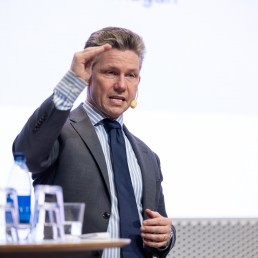
The minister directly addressed startups and scaleups: “I’m here today because I need your help. We want to work more with you, and we need to make this journey together to make Sweden safer, now and in the future” the minister stressed.
Partnering for a secure future
Collaboration, innovation, and a shared commitment to security are vital for tech companies and the defence sector alike. By embracing these principles, Sweden and Europe can navigate modern security challenges, ensuring a safer tomorrow.
This discussion underscores a collective ambition to not only address current security challenges but also work proactively to prepare for the future. Central to these efforts is the role of startups and scaleups, whose groundbreaking innovations are key to driving Sweden’s technological advancements in defence.
However, this requires an ecosystem that supports innovation and new partnerships, ensuring accessible funding, supportive policies, and platforms that foster cross-sectoral collaborations. The way forward is marked by collaboration, innovation, and a shared commitment to national and global security.
New funding and collaboration opportunities
Sweden and Europe are responding to the need for defense innovation by introducing several key funding and collaboration opportunities. These efforts aim to engage startups and scaleups, empowering them to bring innovative solutions to the defense sector. By focusing on these companies, the goal is to make the defense industry more dynamic and responsive to evolving security needs.
Some of these initiatives are:
European Defence Fund (EDF)
A European Commission initiative, aimed to support collaborative defence projects. It focuses on funding the development of small and medium enterprises (SMEs) at various stages, from research to market deployment.
NATO Innovation Fund (NIF)
Aimed at enhancing NATO’s innovation ecosystem, NIF supports deep tech innovations in science, technology, engineering and mathematics (STEM). It facilitates the commercialization of technologies vital for the Alliance’s security by addressing the funding gap in the market.
DIANA (NATO)
An acceleration program and network of test centers connecting startups with end users, scientists, and integrators to promote the development of dual-use deep tech solutions for NATO.
Säkerhets- och försvarsföretagen (SOFF)
A trade association for the security and defence industry in Sweden. SOFF works to improve market access and trade opportunities for companies within the sector, fostering a competitive business environment.
SME-D
As a network and knowledge hub, SME-D promotes collaboration, competence development, and experience exchange. Its goal is to enhance the competitiveness of its members and ensure the continuous supply of skills in the industry.
Safety in the digital age
Safety in the digital age
Perceived safety is a growing concern in cities across Sweden. As urban populations grow and environments become more complex, these challenges underscore the importance of creating secure, inclusive spaces for all residents. New technologies and models for collaboration offer key solutions to understanding and addressing these issues. This evolving landscape presents a prime opportunity for small tech companies to play a role in developing smart city solutions.
In 2023, the Safety Lab (Trygghetslabbet) served as a platform for municipalities, companies, and researchers to collaborate and explore innovative methods.
Several activities and initiatives took place within the Safety Lab framework and this article highlights two.
IMY pilot measuring public safety
This collaborative pilot investigated grey areas in data protection regulations, aiming to improve public sector efficiency and service while protecting citizen rights and privacy. The project, involving Kista Science City, IMY, IoT Sverige, and the City of Stockholm (Trafikkontoret), utilized LiDAR sensors to assess the effectiveness of safety measures by measuring movement in public spaces.
The “regulatory sandbox” format guides in interpreting and applying data protection regulations and opens doors for small tech companies to navigate complex regulations. This investigative and dialogue-based approach offered valuable learning and sharing opportunities for participating tech companies and stakeholders. The final report facilitates further understanding and serves as a reference for future projects navigating complex technology and legal grey areas.
Forum for urban safety with IoT
A series of workshops, aimed to accelerate learning and problem-solving through collaboration, focusing on leveraging Internet of Things (IoT) technologies to address urban safety concerns with a specific interest in ethics and integrity. These sessions brought together diverse stakeholders to brainstorm, share insights, and pilot innovative solutions directly impacting urban safety and community well-being. Nationellt forum för trygget i stadsrummet
Lucas Uhlén, project leader at Kista Science City, explains: “Our workshops were designed to initiate a testing environment where the focus was on how IoT can enhance the feeling of safety. By bringing together various actors, we sought to enhance our understanding of how innovative solutions can contribute to a safer, more appealing society.”
Uhlén further emphasizes the importance of early legal inclusion: “Engaging with legal experts from the start ensured our initiatives were grounded in respect for privacy, setting the course for this initiative but also setting an example for future projects.”
A model for the future
The Forum’s inclusive and forward-thinking approach complements traditional project methods. Integrating various stakeholders and legal considerations from the outset offers a valuable strategy for responsible and inclusive innovation across different sectors.
The Forum has laid the groundwork for future innovations, demonstrating the importance of collaboration, foresight, and a commitment to ethical principles in the pursuit of public safety.
Opportunities for businesses
The needs-based pilots in the Safety Lab have opened doors for small tech companies to break new ground. By understanding the public sector’s needs, participating in pilots, and actively engaging with stakeholders, companies can unlock valuable opportunities.
- Gain early insight: Gain crucial knowledge about the market framework and stay ahead of the curve by understanding evolving needs.
- Influence the market: Actively participate in pilots to shape future regulations and standards, ensuring your voice is heard in shaping the industry’s direction.
- Drive market growth: Contribute to the overall growth of the IoT and public safety market through your innovative solutions, fostering a safer and more secure future for communities.
Read the report Trygghet-i-stadsrummet to learn more about the projects and how innovative solution are shaping safer urban environment.
The Scale Hub
The Scale Hub
For scaleups with global ambitions
Scaling is intense. That is why Scale Hub isn’t. We’ve designed a module based platform to fast-track your growth.
The Scale Hub is for founders that have successfully navigated the startup journey and are ready to grow. Our focus is transformative tech companies redefining entire sectors while contributing to a sustainable future.

Contact
Arash Sangari,
arash.sangari@kista.com
Tatjana Choudhary,
tatjana.choudhary@kista.com
What we are looking for
We focus on tech entrepreneurs who have successfully navigated the early stages of the startup journey and are now focused on scaling their operations. Our primary emphasis is on groundbreaking technologies with the potential to revolutionize industries and societies.
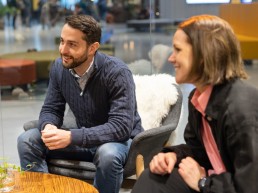

Requirements
The Scale Hub’s is for companies with:
- A team of 10 employees.
- An achieved 20% annual revenue growth over three consecutive years.
- Successfully raised seed capital.
- Registred as a Swedish AB.
We’re always open to exploring potential collaborations and opportunities. If you’re interested in joining or discussing how we can work together or have any questions, please don’t hesitate to book an introductory meeting with Arash Sangari.
